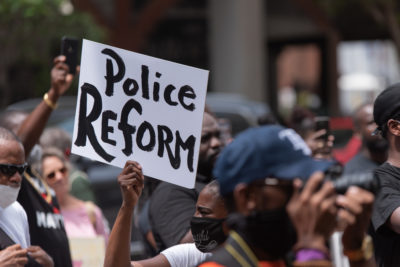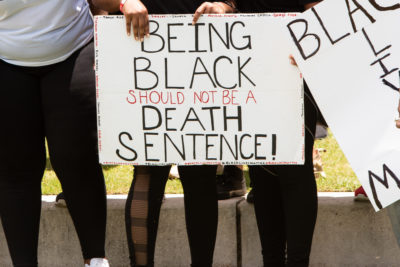As the judge read the verdict, I was tense, holding my breath and silently bracing myself. Like most of us, I did not know what to expect. We have been here before. We have watched black people murdered and assaulted by police on camera more times than we would like to admit. We have watched juries and judges acquit and have been left with the pain, sadness and anger that comes with another black person killed by police without any accountability.
It was different Tuesday however. After only ten hours, a jury unanimously found Chauvin guilty of all charges. I exhaled and I felt the tears flow. They were tears of joy because I was happy the Floyd family received justice. They were tears of relief as I could rest knowing my city wasn’t going to go up in a sea of flames and tears because it was just one; just one victory after so many killings. I thought of the families that stood with George Floyd’s family during this trial and how they must feel. Those families never heard a jury say “Guilty” when it came to their loved ones.
 Many speak about this moment being a turning point where police are finally held accountable for their actions but for me that is not enough. The Chauvin verdict does not change the hearts and minds of biased and racist police officers plaguing our communities. The verdict does not make me worry less about my black teens and young adults when they get into their cars. The verdict does not change my anxiety when police pull up around me. While I am thrilled that Chauvin is now a convicted murderer, I wonder what this moment means for Black America.
Many speak about this moment being a turning point where police are finally held accountable for their actions but for me that is not enough. The Chauvin verdict does not change the hearts and minds of biased and racist police officers plaguing our communities. The verdict does not make me worry less about my black teens and young adults when they get into their cars. The verdict does not change my anxiety when police pull up around me. While I am thrilled that Chauvin is now a convicted murderer, I wonder what this moment means for Black America.
THERE IS REASON TO CELEBRATE
- Voting Matters. This case proved our local elections matter. States Attorneys, District Attorneys all have the power to bring these killers to trial. Just look at the difference in the cases of George Floyd and Breonna Taylor, there is a reason Breonna’s killers are still free and it starts with the States Attorney’s Office.
- Protests and Social Media Campaigns matter: The murder of George Floyd released a sea of outrage across the globe. Organized protests and social media campaigns flooded streets, news reports and social media repeatedly. The more protests, the louder the call for justice became. People had to listen including those on the state and federal level.
- Young People Matter: We live in a time where young people are criticized for their apathy, yet it was young people who led the charge for justice. Using social media, they organized protests, held corporations accountable and kept the name of victims of police brutality. Their voices were bold, loud and it worked.
THE CRIMINAL JUSTICE SYSTEM HAS TO CHANGE
There is much work to be done to overhaul and improve a criminal justice system rooted in systemic racism and injustice. From the police departments, states attorney’s offices, to the judicial system and State and Federal Legislation, the nation must reckon with this.
Starting with HR 7120 also known as the George Floyd Justice in Policing Act, our government has the power to send a powerful message after the Chauvin verdict. This police reform bill seeks to combat police misconduct, racial bias and excessive force. While not perfect, the passing of this bill on the federal level is a good start. Creating a law enforcement oversight task force and creating a national registry documenting police misconduct is a step towards transparency. Common sense reform such as banning chokeholds, no knock warrants and demanding the use of body cameras on the federal level sets a standard for the nations’ law enforcement agencies to follow. These are all important but even more needs to be done.
DE-ESCULATE AND DISARM
While we take comfort in the fact that the family of George Floyd has finally seen justice, we cannot rest. During the Chauvin trial at least three people were killed in police related shootings. Daunte Wright, Adam Toledo and Ma’Khia Bryant were killed this month.
We have to address why de-escalation is not used first as a means to gain control of a situation. Regardless of the guilt or innocence, the reality is police tend to shoot to kill when suspects are black and brown compared to white suspects. Kyle Rittenhouse, a then 17-year-old teen walked the streets of Kenosha freely with an AR-15 style rifle after killing two people. He was peacefully taken into custody after he drove back home to Illinois after the killings. The insurrectionists at the Capitol were allowed to go home after inciting a day of terror at the Capitol, each arrested after returning home. They were actively attacking police, even killing one, yet, these gun-toting individuals live to face their day in court. Dylan Roof killed eight people in church in Charleston and was peacefully taken into custody and even driven to Burger King before heading to jail.
Police have shown that they are capable of de-escalating a scene and disarming those who pose a threat to police and themselves. We have to demand law enforcement officers face accountability when they do not actively attempt to de-escalate. Shoot to kill cannot be the first option.
 REFORM
REFORM
Over the years with the increased number of recorded police killings, reform bills and police oversight bills have been passed in various state legislatures. In Illinois, the HB 3653 bill signed into law by the Governor eliminating monetary bail, requiring police officers to wear body cameras by 2025, increases protection for whistleblowers and more. The incredibly politicized debate runs the gambit of ideas from “defunding the police” to “creating more “law and order”, depending on what side of the political spectrum one falls under.
What does police reform look like in such a divided nation? As an agency built to capture runaway slaves in its inception, is it possible to have real change in a system that was never built to protect black and brown people? While most agree police and criminal justice reform is necessary, finding a common ground is more challenging. There has to be a consensus between law enforcement, advocates, community leaders, politicians and the community in order to create trust. These reforms must be rooted in accountability, respect and transparency.
REALLOCATE
Law enforcement agencies have funds allocated to them but is it being used properly? As a country, we spend more on law enforcement and the criminal justice system than we do on education and social services. Cities across America are proof that more police do not make neighborhoods safer. This is not to say that police are not needed but we cannot address the roots of violence and crime without tacking the root causes of both. These communities are ravaged with economic hardships, food desserts, poor schools, lack of programs for young people, lack of jobs and resources. Investing funds in restorative justice as part of the solution to reduce crime and mass incarceration. Funds allocated to law enforcement should be reallocated across more than increasing police but spread appropriately between law enforcement agencies, programs, and community initiatives that support a reduction in crime and incarceration.
We have to find a way to support law enforcement agencies while holding them accountable and investing and putting resources back into communities that do not involve criminalizing neighborhoods and the people who live in them.
THERE IS STILL WORK TO BE DONE
George Floyd’s killer may now be jail but he is one of many. There is still more work to be done to ensure that black people are not killed at these rates by police in the first place. Police Reform and Criminal Justice reform must happen now.
Danielle Sanders is a journalist and writer living in Chicago. Find her on social media @DanieSandersOfficial.